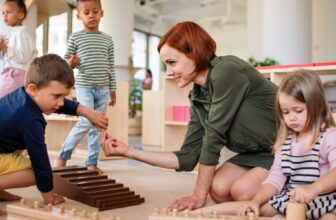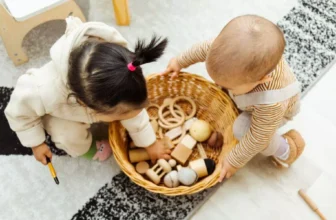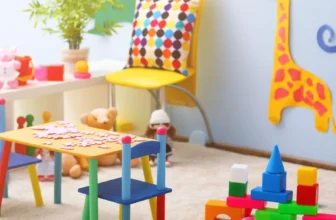
When it comes to early STEM learning, the role of Montessori toys is not to be underestimated. These educational tools offer a hands-on approach that sparks curiosity and nurtures foundational skills in science, technology, engineering, and mathematics. By engaging with Montessori toys, children can develop a solid understanding of complex concepts in a tangible way, setting a strong groundwork for future exploration and discovery. So, how exactly do these toys pave the way for young minds to excel in the realms of STEM? Let's explore further.
Benefits of Montessori Toys for STEM Learning
When exploring the benefits of Montessori toys for STEM learning, consider how these educational tools foster hands-on experimentation and critical thinking skills. Montessori toys are designed to engage children in interactive play that encourages exploration and problem-solving. By manipulating these toys, children learn to observe, hypothesize, and test their ideas, laying a solid foundation for future STEM concepts. The hands-on nature of Montessori toys allows children to experience scientific principles firsthand, making abstract concepts more concrete and understandable.
Additionally, Montessori toys promote creativity and innovation by encouraging children to think outside the box. Through open-ended play, kids develop the ability to approach problems from different angles and come up with unique solutions. This kind of creative thinking is essential in STEM fields where innovation drives progress. By engaging with Montessori toys, children learn to adapt, experiment, and persevere in the face of challenges, skills that are vital for success in STEM disciplines.
Incorporating Montessori Toys in STEM Activities
To enhance STEM learning experiences, consider integrating Montessori toys into hands-on activities that promote exploration and problem-solving skills. Montessori toys are designed to encourage children to engage in open-ended play, sparking curiosity and creativity. By incorporating these toys into STEM activities, children can develop a deeper understanding of concepts such as physics, engineering, and mathematics through hands-on exploration.
Montessori toys like building blocks, shape sorters, and puzzles can be used to introduce basic engineering principles and mathematical concepts in a fun and interactive way. For example, building a structure with blocks can help children understand the basics of balance, weight distribution, and spatial reasoning. Similarly, sorting shapes and solving puzzles can enhance problem-solving skills and logical thinking.
Furthermore, Montessori toys often come with no set instructions, allowing children the freedom to experiment and discover solutions independently. This autonomy fosters a sense of accomplishment and boosts self-confidence, essential elements in nurturing a love for learning and STEM subjects from an early age.
Enhancing Problem-Solving Skills With Montessori Toys
Consider how Montessori toys can sharpen problem-solving skills by fostering independent exploration and experimentation. Montessori toys are designed to encourage children to think critically and creatively when faced with challenges. By presenting problems that require hands-on manipulation and cognitive reasoning, these toys stimulate the brain and promote the development of analytical thinking skills.
Through interaction with Montessori toys, children learn to approach problems methodically, breaking them down into smaller, more manageable parts. This process of breaking down complex issues into simpler components helps children tackle challenges with confidence and persistence. As they experiment with different solutions and observe the outcomes, children refine their problem-solving strategies and adapt their approaches based on the results.
Montessori Toys for Developing Critical Thinking
Montessori toys empower young minds to hone critical thinking skills through hands-on exploration and problem-solving challenges. By engaging with these toys, children can enhance their ability to analyze, evaluate, and make decisions. Activities like puzzles, building blocks, and shape sorters require kids to think logically and strategize their next moves. For example, when faced with a complex puzzle, children must assess different pieces, visualize potential outcomes, and determine the best way to solve it. This process encourages them to think critically, develop patience, and persevere through challenges.
Moreover, Montessori toys often present open-ended opportunities that prompt children to think creatively and outside the box. For instance, building sets with interchangeable parts encourage kids to experiment with various combinations, fostering innovation and original thinking. By engaging in such activities, children not only strengthen their problem-solving skills but also cultivate a mindset that values curiosity and exploration. Montessori toys serve as valuable tools in nurturing young learners' critical thinking abilities, preparing them for future academic and real-world challenges.




